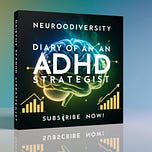The Accidental Bulldozer: When Being Right Goes Wrong
Alex sat in his car, staring at his phone. Another investor had just pulled out.
"Your vision is compelling," the message read, "but we're concerned about team dynamics." It was the third time this month he'd heard some version of this feedback from investors.
As a founder with ADHD, Alex knew his passionate communication style could be overwhelming. Just yesterday, he'd demolished his CTO's proposal in front of the entire team, pointing out every logical flaw with surgical precision.
He'd won the argument but could see in everyone's eyes that he'd lost their trust.
knew his passionate communication style could be overwhelming.
Breaking It Down: The ADHD-Stoicism Connection
The intersection of ADHD and entrepreneurship creates a unique communication challenge.
Entrepreneurs with ADHD often possess the hyperfocus, creative thinking, and risk tolerance that drive innovation, but they can struggle with emotional regulation and social awareness during high-stakes communication and conflicts.
Stoicism the ancient philosophy practiced by figures like Marcus Aurelius and Seneca offers a powerful framework for those who tend to win arguments but lose connections.
At its core, Stoicism teaches that we cannot control external events, only our responses to them.
Why This Matters
For entrepreneurs with ADHD, mastering communication isn't just about politeness—it's about business survival.
Research shows that 65% of startups fail due to interpersonal conflicts among the founding team, not market conditions or product-market fit and execution.
When your brain naturally spotlights logical inconsistencies and gravitates toward debate, you might win individual battles while undermining the psychological safety team members need to take risks and share their ideas.
The Science Behind It
The neurological profile of ADHD creates specific communication patterns that can both help and hinder entrepreneurial success.
Research from the Journal of Attention Disorders found that adults with ADHD often demonstrate stronger verbal reasoning and debate skills but show lower scores on emotional intelligence measures compared to neurotypical control groups.
A 2023 study published in the European Journal of Entrepreneurship and Small Business revealed that entrepreneurs with ADHD were 17% more likely to identify business opportunities but 23% more likely to experience team conflict within the first year of operation.
Meanwhile, research from Harvard Business School found that principles similar to Stoic practices—particularly emotional regulation and perspective-taking—were significant predictors of entrepreneurial longevity and long-term success.
Making It Work: How to Apply This in Real Life
✅ Pause Before Responding – Create a 5-second rule before responding to ideas or proposals. This brief pause allows your prefrontal cortex to engage before your emotional response takes control.
✅ Practice Intellectual Empathy – Before critiquing an idea, force yourself to articulate the strongest version of the other person's argument. This Stoic practice not only improves your understanding but shows respect for their thinking.
✅ Separate Ideas From Identity – Explicitly frame discussions as collaborative explorations rather than personal contests. Say "Let's examine this idea" instead of "Your approach is wrong."
✅ Install Communication Guardrails – Create structured feedback protocols for your team that everyone follows, providing consistent pathways for critique that don't depend on emotional control.
✅ Deploy Stoic Pre-Mortems – Before important meetings, visualize potential communication pitfalls and prepare measured responses, a practice Seneca called "premeditatio malorum" (premeditation of evils and adversities).
Real-Life Examples in Action
Elon Musk, widely believed to have ADHD (though not publicly confirmed), exemplifies both the strengths and challenges of the ADHD entrepreneurial communication style.
After receiving feedback about his blunt communication at SpaceX and Tesla, Musk implemented structured communication protocols including written proposals before meetings and designated devil's advocate roles to separate critique from personal confrontation.
David Neeleman, founder of JetBlue Airways and diagnosed with ADHD, credits his condition for his innovation but acknowledges its communication challenges.
He implemented a personal system where he runs important communications through a trusted advisor before delivery, creating a buffer that has saved countless professional relationships.
Emma Gannon, entrepreneur and author who discusses her ADHD openly, uses a "three perspectives" technique before making important communications: considering her view, the recipient's view, and how a neutral third party would interpret the exchange.
Pro Tips & Insider Insights
🧠 The "ADHD Tax" isn't just financial—it includes the relationship capital lost through impulsive communication. Investing time in communication strategies pays dividends across your entire business ecosystem.
🔄 Develop a personal "trigger phrase" that reminds you to engage your Stoic mindset when you feel your ADHD communication style taking over. Some entrepreneurs use "respond, don't react" or "curiosity before certainty and judgment."
⏱️ Schedule dedicated "disagreement sessions" where team members know critique is expected and welcomed. This creates appropriate containers for the direct communication style that comes naturally to ADHD entrepreneurs.
Key Points
🔹 ADHD entrepreneurial strengths (innovation, pattern recognition, risk tolerance) often come with communication challenges that can undermine team and relationships.
🔹 Stoic practices provide an effective framework for managing the impulsivity and emotional dysregulation that can derail ADHD communication patterns.
🔹 Implementing structured communication protocols creates consistency that doesn't rely on variable executive function and control.
🔹 The goal isn't to win arguments but to create the psychological safety necessary for innovation and collaborative problem-solving.
🔹 Small communication investments (pauses, empathetic listening, structured feedback) yield enormous returns in team cohesion and business outcomes.
Further Reading (Books & Resources)
📖 The Obstacle Is the Way: The Timeless Art of Turning Trials into Triumph – Ryan Holiday's modern take on Stoic philosophy for entrepreneurs.
📖 Delivered from Distraction: Getting the Most out of Life with Attention Deficit Disorder – Edward M. Hallowell and John J. Ratey's comprehensive guide to ADHD management.
📖 Crucial Conversations: Tools for Talking When Stakes Are High – A practical guide to high-stakes communication that resonates with ADHD challenges.
Practical Tools & Apps
🔧 Headspace – Meditation app with specific programs for focus and communication, helping build the mindfulness muscles that support Stoic practices.
🔧 Thought Diary – A digital CBT tool that helps identify cognitive distortions that can derail communication.
🔧 Focus@Will – Neuroscience-based music streaming designed to improve focus and emotional regulation during work.
🔧 Calendly – Scheduling tool that helps create buffers between meetings, giving ADHD entrepreneurs time to process and prepare for communications.
Research & Studies Section (Citations & Sources)
Antshel, K. M. (2018). Attention Deficit/Hyperactivity Disorder (ADHD) and Entrepreneurship. Academy of Management Perspectives, 32(2), 243-265.
Wiklund, J., Yu, W., Tucker, R., & Marino, L. D. (2017). ADHD, impulsivity, and entrepreneurship. Journal of Business Venturing, 32(6), 627-656.
Freeman, M. A., Johnson, S. L., Staudenmaier, P. J., & Zisser, M. R. (2015). Are entrepreneurs "touched with fire"? Pre-publication manuscript. University of California San Francisco.
Hmieleski, K. M., & Lerner, D. A. (2016). The dark side of entrepreneurial personality: Undesirable personality traits as predictors of business venturing and performance. Applied Psychology, 65(4), 660-684.
Neck, C. P., Houghton, J. D., & Murray, E. L. (2019). Organizational Behavior: A Critical-Thinking Approach. SAGE Publications.
Call-to-Action & External Link
Remember, winning every argument might feel satisfying in the moment, but building lasting business relationships creates the foundation for sustainable entrepreneurial success. Start small—this week, try implementing just one Stoic communication practice and observe how it impacts your team dynamics.
🎧 For more insights, check out this ADHD podcast:














Share this post